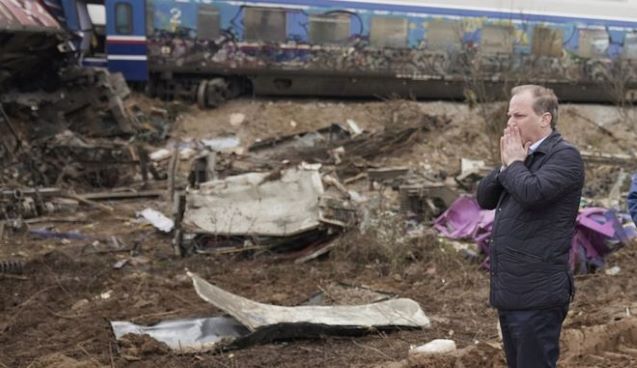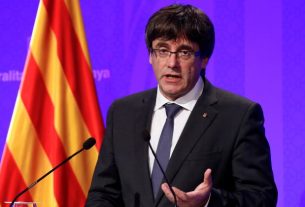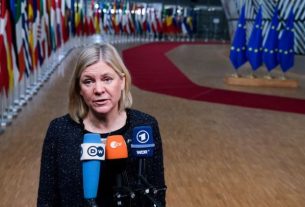At least 36 people were killed and dozens injured in a head-on collision between two trains in Greece, local authorities said.
The crash took place outside the central city of Larissa late on Tuesday, when a passenger train heading from the capital, Athens, to Thessaloniki collided with a cargo train travelling from the northern city.
Some of the passenger carriages exploded in flames from the impact.
Rail operator Hellenic Train reported about 350 people had been on the passenger train, which left Athens at 7.22pm (19:22 GMT).
Kostas Karamanlis, Greece’s transport minister, resigned after visiting the site of the crash, saying he felt it was his “duty” to step down.
“The pain is unspeakable,” he said. “When something so tragic happens, it is not possible to carry on as if nothing happened.
“I consider it a necessary element of our democracy that the citizens of our country trust the political system. This is called political responsibility.”
At least 66 people were injured in the crash, including six in intensive care, while about 250 passengers, some with minor injuries, were evacuated safely by bus to Thessaloniki, about 130km (80 miles) away.
Hospital units used to treat burn victims in the area were alerted and dozens of ambulances dispatched to the scene.
“We heard a big bang, (it was) 10 nightmarish seconds,” said Stergios Minenis, a 28-year-old passenger who jumped to safety from the wreckage.
“We were turning over in the wagon until we fell on our sides … then there was panic, cables (everywhere) fire, the fire was immediate, as we were turning over we were being burned, fire was right and left.”
‘Never seen anything like this’
Prime Minister Kyriakos Mitsotakis’ office announced a three-day national mourning period.
Meanwhile, Greek President Katerina Sakellaropoulou said she was cutting short a visit to Moldova to return to Greece.
“Unfortunately, I have to interrupt my visit in order to be close to my people, to support those who need it,” she told a joint news conference in the Moldovan capital, Chisinau, alongside Moldovan President Maia Sandu.
Thessaly regional governor Konstantinos Agorastos said the two trains hurtled towards each other on the same track.
“They were travelling at great speed and one (driver) didn’t know the other was coming,” he added.
The first four carriages of the passenger train were derailed in the crash, with the first two carriages, which caught fire, “almost completely destroyed”, Agorastos said.
Television footage showed derailed carriages with cargo containers flipped over and crash debris strewn across a nearby road. Rescue workers with high-powered torches were searching through the wreckage for trapped passengers. Some were scouring the surrounding fields for survivors.
“We are living through a tragedy. We are pulling out people alive, injured … there are dead. We are going to be here all night, until we finish, until we find the last person,” a volunteer rescue worker told the ERT public broadcaster.
Rescue crews illuminated the scene with floodlights before dawn on Wednesday as they searched frantically through the twisted, smoking wreckage for survivors.
“I’ve never seen anything like this in my entire life. It’s tragic. Five hours later, we are finding bodies,” an exhausted rescuer said as he emerged from a carriage.
An emergency government meeting was organised after the crash and Greek health minister Thanos Plevris went to the scene.
“There was panic in the carriage, people were screaming,” a young man who was evacuated to a nearby bridge told SKAI TV.
A passenger named Lazos told the newspaper Proto Thema that the experience had been “very shocking”.
“I wasn’t hurt but I was stained with blood from other people who were hurt near me,” he said.
Greece sold railway operator TRAINOSE to Italy’s Ferrovie dello Stato Italiane in 2017 as part of its international bailout programme, in the expectation that hundreds of millions of euros would be invested in rail infrastructure.__Al Jazeera





